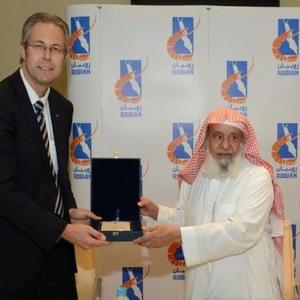BASF, National Prawn Co. cooperate on algae technology

Photo: National Prawn Co.
July 11, 2013
BY Ron Kotrba
Saudi Arabia-based National Prawn Co. and the German chemical giant BASF have signed an agreement to work together in developing algae technology. NPC is experienced in designing, building and operating large manmade lakes for its shrimp business, and more recently the firm is developing research programs on new algae species as well as sponsoring aquaculture projects internationally. NPC said BASF is a global leader in technologies used for growing and harvesting algae in open-pond-systems, and in processing algae biomass into products used in beverages and dietary supplements.
One important reason for this collaboration, NPC stated, is the climatic conditions of the Red Sea desert coast line of Western Saudi Arabia that meet the environmental needs of seawater algae and promote algae growth.
Advertisement
“[This] signed contract is marking once more the ability of Saudi companies to be equal partners with world-class enterprises like BASF,” said NPC’s chairman Sulaiman Bin Abdul Aziz Al Rajhi. “It also shows that we are capable of offering solutions for domestic and global needs. We are looking forward to a long cooperation with BASF, the world’s leading chemical company.”
“With our portfolio in the market segments of food, beverages and dietary supplements we are able to meet and anticipate future needs,” said Michael Ceranski, senior vice president of BASF`s human nutrition business unit. “At the same time we are constantly trying to enhance nutrition quality and promote technological innovations. Within these ambitious goals new partnerships like the collaboration with National Prawn Co. are fundamental for us: NPC gives us access to more biomass from algae and to use and leverage the all-year nonchanging climate conditions in Saudi Arabia.”
Advertisement
Eng. Ahmad Rasheed Al-Ballaa, managing director of NPC, added, “We are very pleased and proud that National Prawn Co. and BASF have succeeded in establishing this cooperation, bringing together the best of both companies to create a unique aquaculture project.”
Related Stories
The Michigan Advanced Biofuels Coalition and Green Marine are partnering to accelerating adoption of sustainable biofuels to improve air quality and reduce GHG emissions in Michigan and across the Great Lakes and St. Lawrence Seaway.
The USDA reduced its outlook for 2024-’25 soybean oil use in biofuel production in its latest World Agricultural Supply and Demand Estimates report, released April 10. The outlook for soybean oil pricing was revised up.
EIA reduces production forecasts for biobased diesel, increases forecast for other fuels, including SAF
The U.S. Energy Information Administration reduced its 2025 forecasts for renewable diesel and biodiesel in its latest Short-Term Energy Outlook, released April 10. The outlook for “other biofuel” production, which includes SAF, was raised.
FutureFuel Corp. on March 26 announced the restart of its 59 MMgy biodiesel plant in Batesville, Arkansas. The company’s annual report, released April 4, indicates biodiesel production was down 24% last year when compared to 2023.
Neste has started producing SAF at its renewable products refinery in Rotterdam. The refinery has been modified to enable Neste to produce up to 500,000 tons of SAF per year. Neste’s global SAF production capacity is now 1.5 million tons.
Upcoming Events










